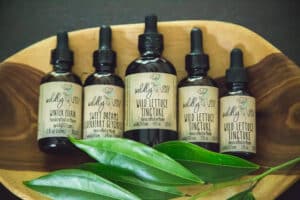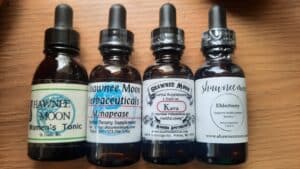In my last post, I discussed how inflammation is the immune system’s natural response to allergens, foreign bodies and injury. In acute situations, it is necessary and needed. But long term, chronic inflammatory conditions are very damaging and always uncomfortable.
Today I want to discuss some herbs that support the normal process of inflammation, helping out your immune system, to get you through those acute inflammatory issues, quickly, and hopefully, with the least amount of discomfort.
Herbs during seasonal discomfort
Herbs like stinging nettle and onion peels are useful during these times of year, as they work within the body as natural antihistamines. Histamines are part of the natural system in the body that triggers the normal inflammatory response I talked about in my earlier post. While inflammation is a natural, normal and initially a good thing, it can be uncomfortable and if it becomes chronic can lead to other lasting issues or problems.
While many, many herbs are known to bring relief by simply supporting the immune system in this normal pathway and processes of inflammation, today I’m just going to outline a few that I tend to reach for first.
Stinging Nettle – (Urtica urens) is a histamine and an antihistamine! The fresh plant has ‘hairs’ that sting like a bee and literally inject a histamine that reacts by creating a stinging rash on the skin when touched. But the juice of the plant acts as its own antidote! Taking this plant internally, either cooked properly as food or a tea fresh, or dried and then used in teas, tinctures, etc, has no stinging effect, and your body utilizes all its wonderful antihistamine abilities.
Licorice root – (glycyrrhizza galbra) often suggested as a respiratory tonic, as it is supportive of the natural inflammation process, speeding it along. It is a ‘demulcent’, so it is soothing to inflamed mucous membranes, is calming, and helps a non-productive cough.
Lemon balm – (melissa officinalis) supports the histamine response, and helps the immune system clear up ickies in the body. Antioxidant while also being a calming herb, so helps relieve pressure and bring relaxation instead of tension.
Onion skins – particularly red and yellow onion skins, contain substantial amounts of quercetin. Quercetin is a natural compound found in many plants that is antioxidant and anti-inflammatory. This year I was able to grow my own onions and harvest the skins to preserve for use in the lab. I am so happy to hopefully continue being more and more self-sustaining in the coming years.
Ginger – (zingiber officinale) ginger is a warming herb, so it stimulates circulation. Herbs that are warming and stimulate blood flow are also going to be hastening the immune system circulating, getting herbs where they need to be in the body and making everything work better. It is an antioxidant and supports that inflammation process we keep talking about.
Uva ursi – (arctostaphylos uva-ursi) not an obvious choice for seasonal discomfort, but one Victoria used in these situations. It is supportive of the inflammatory process, and it is a tonic for the kidneys and entire urinary tract. Supporting elimination organs is a key part of helping eliminate foreing bodies or allergens.
Marshmallow – (althaea officinalis) another demulcent (a plant that’s soothing to mucous membranes). When the respiratory system is inflamed from allergens, you want something that will be calming and soothing to that tract. Marshmallow is a good one ofr that.
Dandelion – (taraxacum officinalis) another one not immediately obvious for seasonal discomfort, but like the uva ursi, this plant will support elimination organs do what they do best (get rid of toxins). It is all about supporting the body’s normal, healthy processes.
These plants can be used in routine for maintenance, and also you can up your intake when seasons are worse to take a serving up to 4 times a day. Being consistent and diligent is key for results! When you purchase pills or get a prescription from the doctor, you make a point of adding it to your schedule. Do the same with your herbs for maximum effectiveness. Even if herbs are not considered medicine by the FDA, they are considered dietary supplements and they are intended to support normal processes that the body is already functioning in.
Essential oils and seasonal wellness
The discomfort that comes along with seasonal allergies can be debilitating. And while herbs are supporting your system over time with your consistent usage, essential oils can bring some more immediate relief in some cases.
Oils like eucalyptus and coniferous oils (oils from evergreen trees) are invigorating to the respiratory tract and can support loosening and opening clear, normal breathing. Applied diluted to the chest, back of neck and under the nose can bring immediate comfort and relaxation. Add to your diffuser, apply right before a hot shower and breath deeply allowing the steam to work its wonders.
Consider adding oils with menthol, like peppermint, wintergreen and spearmint for their cooling relief. If I have time to lay my head back for 5-10 mins, I like putting a drop of peppermint neat under my eyes (careful not to get it IN your eyes, it will burn), then lay back, ice pack on my forehead, eyes closed. This cooling sensation on my upper cheeks is so refreshing to the pressure I feel there occasionally. Atfer 10 mins or so, the oil has ‘diffused’ in a sense, and I can sit up refreshed. (If you do this and sit up too soon, the diffusion of the oil can be slightly stinging to your eyes, and may cause your eyes to water). Add a drop each of lemon and lavender to the peppermint for an extra boost (this blend is commonly added to the diffuser and to roller blends for additional comfort and seasonal support).
For more information on essential oils and what I recommend, check out my page all about essential oils!
All the seasonal support
When adding herbs and oils to your routine, it is a good idea to commit to being consistent about your regimen with them, and also monitoring your response over a certain amount of time. Take notes, keep a track record, what did you do this day or that, did you spend more time outside in the elements, was the regimen as effective that day? Maybe take these herbs before bed because often much of the discomfort can be felt first thing in the morning.
Another thing to consider, is if you don’t already take a shower before bed, start doing so. Even if it is just a quick rinse down. Especially if you have been outside during the day, pollen can cling to your hair and body and then you roll around in it in your bed and compound your situation.
This time of year, it is glorious to open the windows and air out a stuffy home. But with that cool fresh air you are also drawing in pollen. For bed rooms, consider covering your pillows with a towel while the windows are open. Once you close them, remove the towel gently and wash. This will have hopefully kept pollen off your pillow.
There are so many more herbs and oils we could talk about for seasonal wellness, but this should wrap it up for now. What do you use for seasonal issues and the natural inflammatory response? Did I miss your favorite herbs and oils? What would you add to this post?





